7 Best AI Healthcare Analytics Tools for Optimizing Patient Care
Quick Summary
This article compares top AI healthcare analytics tools, including WisdomAI, Truven by Merative, and Innovaccer. Each platform offers unique features, but WisdomAI stands out with its natural language querying and AI-driven insights, making it the most accessible and efficient choice for healthcare teams. Check our blog for more valuable reviews and recommendations.
Want to Make Smarter Decisions with AI Healthcare Analytics?
In healthcare, quick access to data insights can make all the difference in patient care. While legacy BI tools are widely used, they often come with limitations in speed and flexibility.
AI-powered analytics tools, however, are changing the game by making it easier for providers to get meaningful insights and make informed decisions. But with so many options available, how do you know which one is right for you?
In this WisdomAI article, we’ll explore the best AI healthcare analytics tools, discussing how each can improve outcomes and efficiency.
Why Listen to Us?
At WisdomAI, we don’t just talk about AI analytics, we’ve built an AI analytics solution that delivers real results. For example, Descope reduced the time spent on report gathering and creation by 90% with our platform, ensuring faster and more efficient decision-making across board.

This article mirrors our expertise to highlight the best AI healthcare analytics tools to help you make the right choice.
What Are AI Healthcare Analytics Tools?
AI healthcare analytics tools are software that help healthcare providers make smarter decisions by analyzing data. They use advanced algorithms to process large volumes of medical data from sources like patient records, medical images, and test results, identifying patterns in health data that might be missed by humans.
Unlike the traditional BI tools, AI-powered analytics tools for healthcare can handle vast amounts of data quickly, giving providers access to critical information in real time. They also connect with other existing systems, making it easier to access and process data for improved decision-making and overall patient care.
Why Use AI Healthcare Analytics Software?
These tools empower healthcare teams to deliver more precise, efficient, and timely care, enhancing both patient outcomes and productivity.
- Unified Data Access: AI healthcare analytics tools brings together patient data from EHRs, labs, and devices, giving your team clean, integrated insights.
- Seamless Integration: These tools work smoothly with existing and legacy systems, so analytics deliver value without disrupting workflows.
- Built-In Compliance: They handle HIPAA, GDPR, and regional rules automatically, keeping data use safe and reliable.
- Increased Efficiency: AI healthcare analytics tools help automate administrative tasks. This reduces clinician workload, giving teams more time for direct patient care and improving overall efficiency.
Top 7 AI Healthcare Analytics Tools for Healthcare Teams
Before we look at each tool in detail, here’s a side-by-side comparison giving you a quick glimpse into how each ranks:
While all platforms offer valuable features, WisdomAI stands out with its AI-driven insights and natural language querying, making it the most accessible and efficient choice for healthcare teams. Its ability to deliver real-time, actionable insights without technical expertise sets it apart as the top solution.
Now, to the review in full.
1. WisdomAI
WisdomAI is an AI-first healthcare analytics platform that turns complex data into actionable insights. It integrates structured and unstructured sources, including EHRs, labs, and medical imaging through a dedicated Knowledge Fabric. This enables teams to query and analyze information in plain English, supporting faster, data-driven clinical and operational decisions.
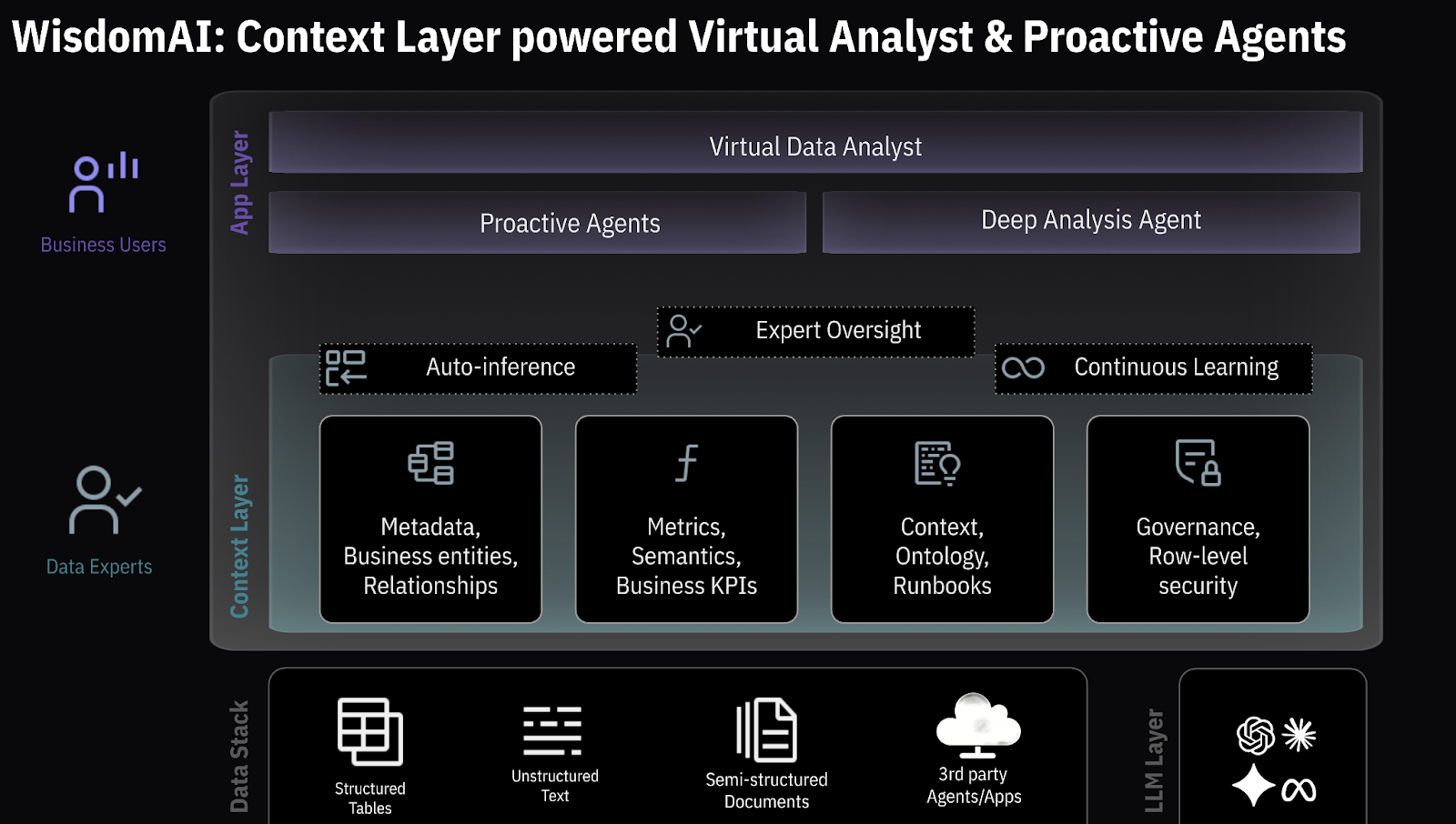
Combining natural language queries with proactive and deep analysis agents, our platform allows healthcare teams to access insights without relying on data specialists. You can interact through conversational AI, dashboards, and automated reporting, reducing administrative tasks and freeing clinicians to focus on care.
While traditional healthcare BI tools rely solely on manual querying, WisdomAI adds a layer of AI intelligence, proactively surfacing actionable insights just when you need them.
Key Features
- Natural Language Queries: Users can ask questions in plain English and receive instant, visual insights. This simplifies data exploration, allowing healthcare teams to access information without technical expertise.
- Deep Analysis Agent: Provides in-depth explanations of data patterns and trends. It delivers actionable recommendations to support clinical and operational decision-making.
- Stories/Dashboards: Offers customizable visualizations for patient and operational data. Teams can track performance and trends in an intuitive, centralized interface.
- Knowledge Fabric Layer: Integrates structured and unstructured data for unified access. This ensures consistency, accuracy, and reliable insights across all data sources.
- Proactive Monitoring: Continuously monitors key metrics, detects anomalies, and sends alerts. It also automates reporting workflows to reduce administrative workload and improve efficiency.
- Seamless Integration: Connects with platforms like Snowflake, BigQuery, Databricks, and others. This enables a unified view of data without complex configuration or coding.
Pricing
At WisdomAI, we offer tiered plans designed to meet diverse healthcare needs. Each plan provides access to our AI-driven analytics, proactive agents, and secure integrations, with flexibility to scale usage as your team grows. Book a demo today to see how it works.
Pros
- Delivers real-time insights across multiple data sources
- Reduces repetitive work for clinical and admin staff
- Supports non-technical users with natural language queries
- Improves accuracy with context-aware AI recommendations
- HIPAA-compliant platform suitable for healthcare organizations
Cons
- Advanced features may be underused without training
2. Truven by Merative
Truven by Merative is a healthcare analytics platform that combines AI with real-world data to improve both health and financial outcomes. It brings together predictive analytics and insights from various data sources, including EHRs and claims data, so healthcare teams can make more informed decisions.
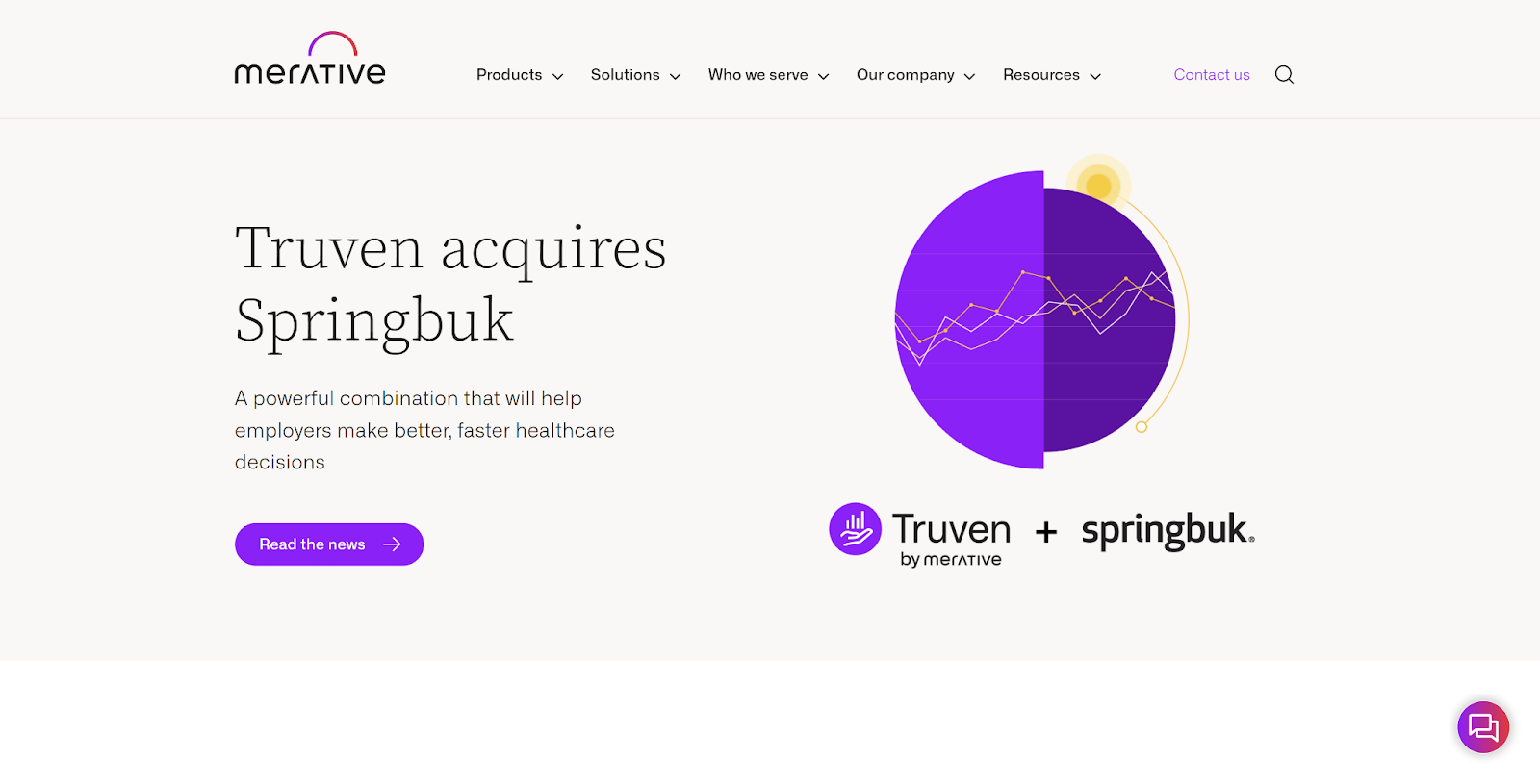
With flexible analytics tools, real-time insights, and benchmarking features, Truven helps teams get the tailored, actionable insights they need. It’s a strong choice for organizations focused on employer- and payer-oriented analytics, offering fast results and pre-packaged benchmarks to drive efficiency and value.
Key Features
- Health Insights: Provides pre-configured dashboards and predictive analytics to highlight cost drivers and program effectiveness.
- Flexible Analytics: Offers access to industry-standard models for cost reduction, trend prediction, and population health management.
- Benefits Mentor: Guides employees to the best health plan options based on claims data, improving decision-making.
- MarketScan® Databases: Provides extensive longitudinal claims data for real-world evidence and benchmarking.
- Treatment Cost Calculator: Helps estimate out-of-pocket costs, enhancing price transparency and compliance.
Pricing
Truven offers customized pricing based on your organization's specific needs. Pricing is available through direct consultation.
Pros
- Customizable dashboards and reporting features
- User-friendly interface with easy-to-understand dashboards
- Access to vast real-world data for benchmarking
Cons
- Initial investment for data feed setup
- Limited ongoing support for small companies
- Requires significant customization for specific needs
3. Innovaccer’s Data Activation Platform
Another AI healthcare analytics tool to consider is Innovaccer’s Data Activation Platform. It unifies fragmented healthcare data into a single patient record and enriches it with quality measures and gap-in-care insights, making it ready for analytics, AI, and operational use.

The cloud-based platform offers AI-driven real-time monitoring, predictive analytics, and cohort building to improve patient engagement, reduce costs, and streamline operations. Innovaccer is ideal when fragmented data is slowing decision-making and you need fast data unification and activation in daily workflows.
Key Features
- Unified Data Model: Integrates data from diverse sources, creating a single view of key patient and provider information.
- Data Quality Pipeline: Applies over 6,000 granular data quality rules to ensure accurate, normalized data.
- AI-Powered Analytics: Uses advanced algorithms to enrich data with actionable insights such as quality measures and gaps in care.
- Modular Architecture: Offers a flexible, scalable approach to meet the evolving needs of healthcare organizations.
- Cloud-Based Infrastructure: Supports agile implementation and future scalability, essential for successful digital transformation.
Pricing
Innovaccer offers custom pricing tailored to the size and needs of the organization. Pricing details are shared through direct consultations to ensure solutions meet specific requirements.
Pros
- Comprehensive integration of diverse data sources
- High-quality, validated data for better decision-making
- AI-driven insights to support actionable interventions
- Strong data governance ensuring security and compliance
Cons
- Full implementation may need dedicated resources
- Advanced features usually require specialized training
- Limited resources for small-scale customers compared to large health systems
4. Healthcare Intelligence by Epic
Epic’s Healthcare Intelligence platform provides organizations with integrated, actionable insights by unifying healthcare data. It combines real-world evidence, AI, and data integration to improve decision-making and patient outcomes.
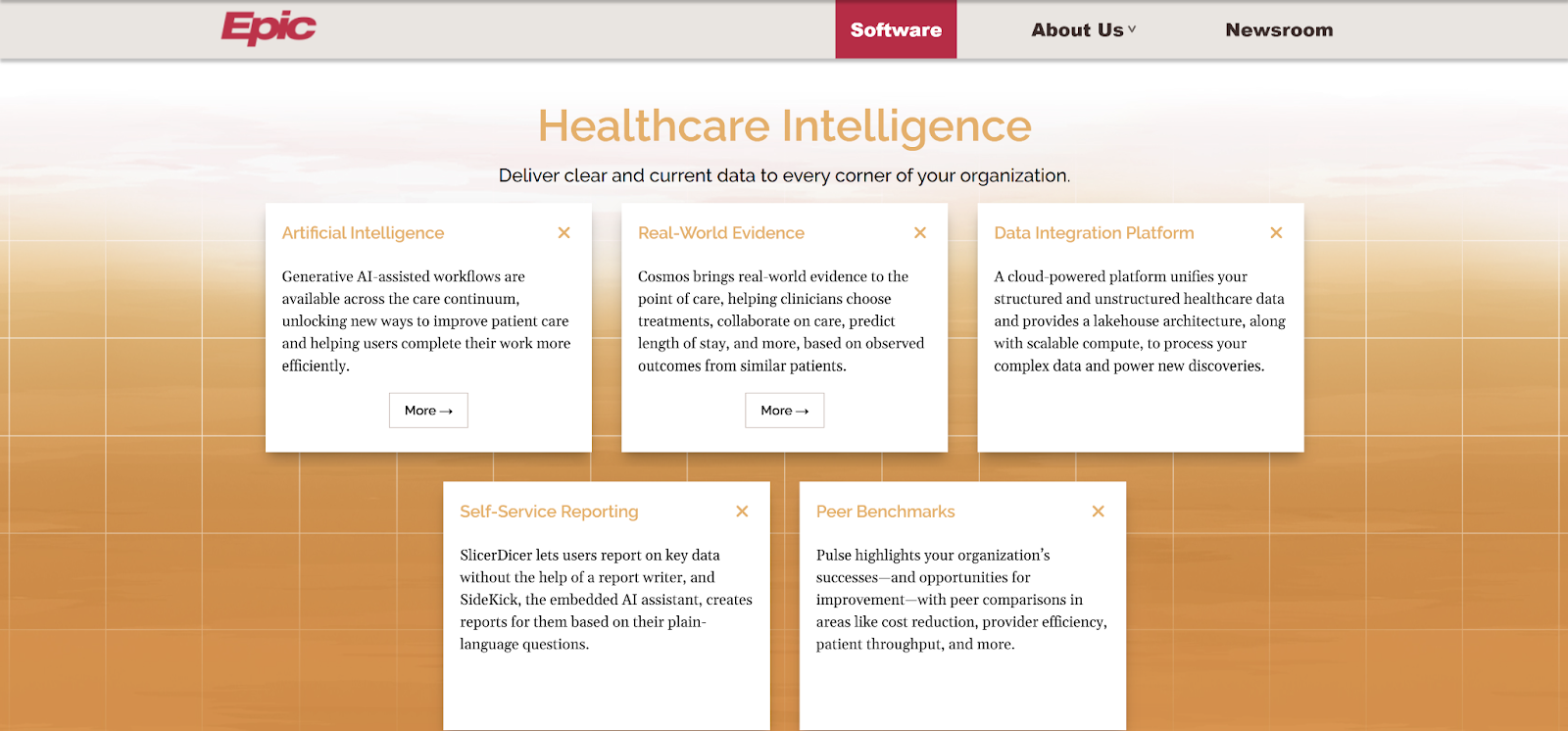
Epic’s solution enables organizations to make more informed clinical and operational decisions, supporting both patient care and system efficiency. Self-service reporting tools like SlicerDicer and SideKick (an AI assistant) simplify data analysis, while Pulse offers peer benchmarks to highlight strengths and areas for improvement.
Key Features
- Real-World Evidence (Cosmos): Brings real-world patient data to help clinicians make informed treatment decisions.
- AI-Assisted Workflows: Generative AI helps users streamline tasks and enhance patient care across the care continuum.
- Data Integration Platform: Unifies structured and unstructured data using a cloud-powered lakehouse architecture.
- Self-Service Reporting (SlicerDicer): Allows users to generate reports independently without needing a report writer.
- Peer Benchmarks (Pulse): Compares organizational performance against peers, identifying opportunities for improvement.
Pricing
Pricing for Healthcare Intelligence by Epic is not publicly available but can be provided through direct consultation.
Pros
- Highly secure platform for safeguarding healthcare data
- Integrates diverse data sources for a unified view
- AI-driven insights enhance decision-making and care
- User-friendly reporting tools for self-service access
Cons
- Steep learning curve, especially without historical data
- Complex interface for new users with too many navigation options
- Design reminiscent of old software
5. Health Catalyst Healthcare Analytics Platform
Health Catalyst is another AI healthcare data and analytics platform designed to help health systems improve clinical quality, reduce costs, and optimize operations. The platform integrates clinical, operational, and financial data to offer a comprehensive view of patient and provider performance.

Unlike traditional analytics tools, Health Catalyst is purpose-built to handle the complexities of healthcare data and workflows, offering a solution tailored to the healthcare industry. It stands out with its outcome-focused approach and extensive off-platform support, making it a strong contender for organizations seeking platform plus services.
Key Features
- Unified Data Platform: Ingests and standardizes clinical, operational, and financial data from over 300 sources into an enterprise repository for analytics and reporting.
- Prebuilt Analytic Applications: Includes domain-specific apps for areas like quality, population health, revenue cycle, and operational performance, enabling quick deployment.
- Interoperability: Seamlessly connects with various healthcare systems like EHRs and third-party data sources for a unified view of patient journeys.
- Self-Service Analytics: Empowers users to generate reports and insights independently, reducing reliance on IT teams.
Pricing
Health Catalyst does not provide direct pricing information on its website. Pricing typically depends on the size of the organization and specific implementation needs, including potential services engagement.
Pros
- Combines analytics technology with implementation support
- Prepackaged content reduces time-to-value
- Seamless interoperability with multiple systems
Cons
- Requires partnership or services engagement for full outcomes
- Complex integration if using external data sources
- May require significant setup for first-time users
6. Arcadia
Arcadia is a cloud-based healthcare data platform built to aggregate, analyze, and activate data across the care continuum. Its data lakehouse architecture unifies over 2,600 disparate sources like EHRs, claims, social determinants of health, and pharmacy records, allowing healthcare organizations to make data-driven decisions.
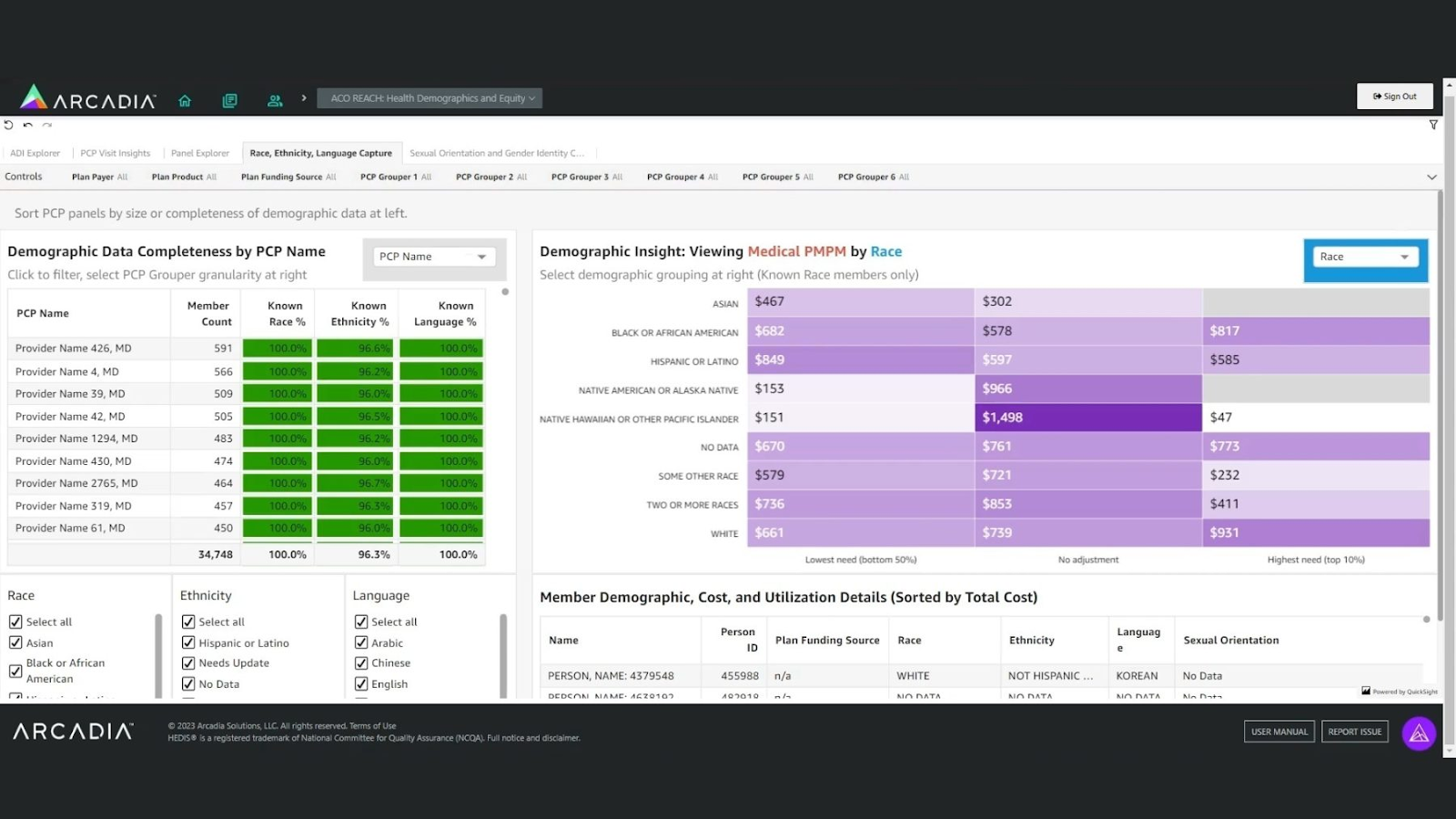
With real-time insights and AI-powered tools, Arcadia helps healthcare providers improve patient outcomes, reduce costs, and enhance care efficiency. The platform is designed to support value-based care initiatives, offering a foundation for long-term success in a dynamic healthcare environment.
Key Features
- Analytics and Reporting: Offers prebuilt measures for quality, cost, utilization, and VBC reporting, alongside custom reporting capabilities to tailor data to organizational needs.
- AI and Predictive Tooling: Provides embedded predictive models and tools for analysts to build and operationalize custom models, helping improve care predictions and decision-making.
- Population Health and Risk Stratification: Enables cohort discovery, risk scoring, and attribution to improve care management and support VBC programs.
- Interoperability and APIs: Supports integration with care management systems, payer workflows, and third-party analytics through APIs and standards-based outputs.
- Governance and Data Management: Tools for data lineage, mapping, and governance to meet regulatory and contracting requirements.
Pricing
Pricing is available upon request, tailored to the specific needs and scale of each organization.
Pros
- Comprehensive integration of diverse data sources
- AI-driven insights enhance decision-making
- Real-time dashboards for timely insights
- High marks for data governance and interoperability innovations
Cons
- Complexity in environments with multiple fragmented EHRs
- Integration with existing cloud or analytics platforms may require additional assessment
- Requires significant effort to onboard and map non-standard data feeds
7. N1 Health
The final AI healthcare analytics tool on our list is N1 Health.
This cloud-based platform specializes in predicting social risks, identifying high-priority patients, and improving engagement to boost outcomes while lowering costs. By pulling data from over 30 sources and using a healthcare-specific model, N1 Health offers a comprehensive view of each patient.
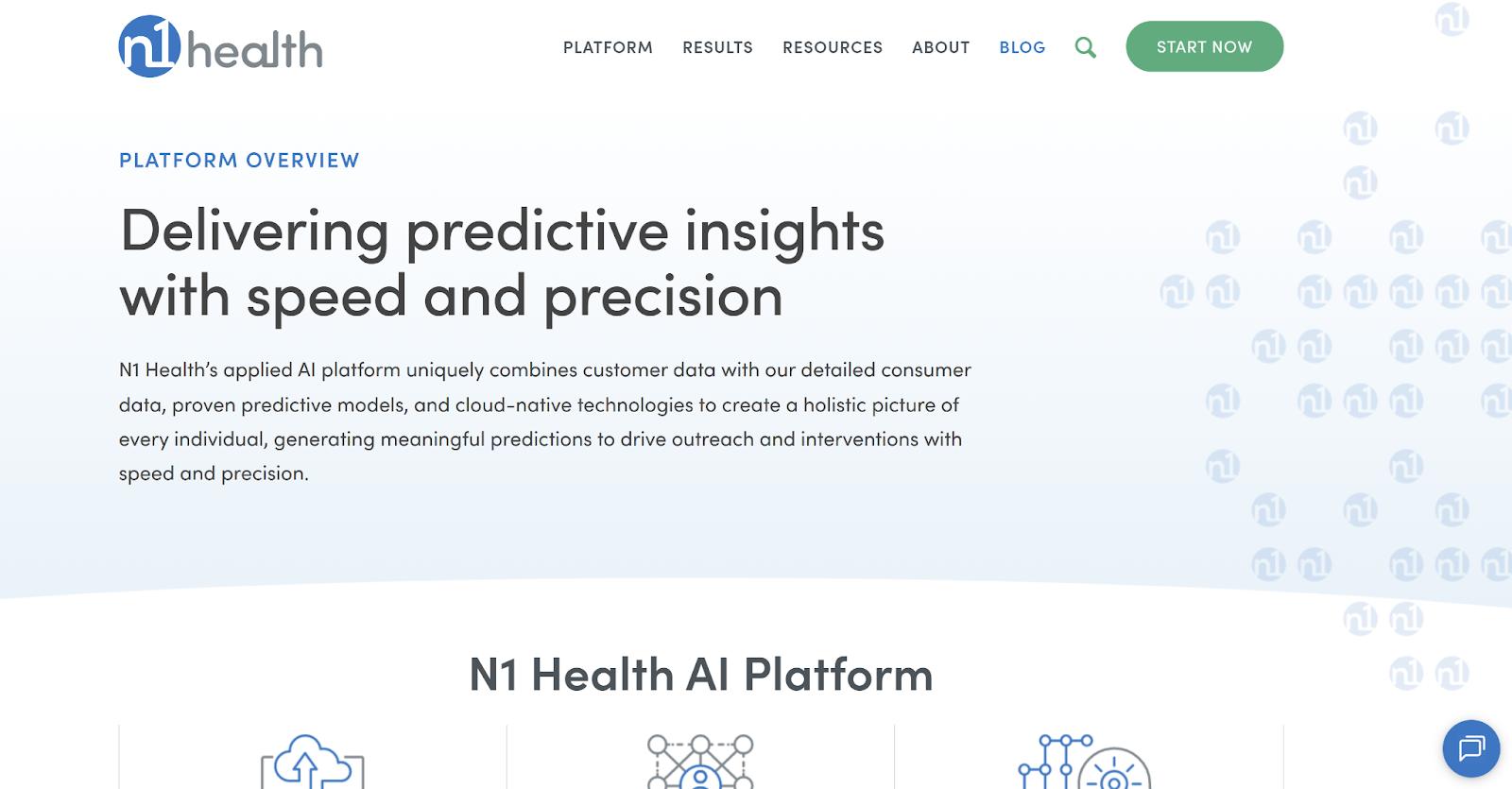
This allows organizations to act quickly and accurately, making data-driven decisions that enhance care. Plus, with its cloud-native setup, there’s no need for complicated installations, making it easy for healthcare providers to implement and scale.
Key Features
- Cloud-Based Infrastructure: No installation needed, offering seamless scalability and flexibility.
- Predictive Models: Built on 3.7 million closed-loop interventions for accurate healthcare predictions.
- Third-Party Data Integration: Combines over 30 data sources, offering 2,500+ insights per individual.
- Actionable Predictions: Predictive insights are used to drive interventions and outreach, optimizing business results.
- Rapid Implementation: Delivers predictive insights in days, not months, ensuring quick action and results.
Pricing
Pricing is available upon request, as N1 Health tailors its solutions based on each organization's specific needs.
Pros
- Focuses on social risk and life-event detection
- Combines AI-powered insights with hands-on program execution
- Tailored for health plans, care management, and population health initiatives
Cons
- Not designed for general-purpose AI model development
- Effectiveness depends on the quality and breadth of available data
- Requires additional integration work for deep workflows
Achieve Faster, Smarter Healthcare Decisions with WisdomAI
In this article, we explored seven AI healthcare analytics tools designed to improve decision-making, streamline workflows, and enhance patient care. Each platform offers unique features tailored to different healthcare needs, but one tool stands out for its ability to transform complex data into actionable insights: WisdomAI.
WisdomAI simplifies data analysis through AI-driven insights, natural language queries, and proactive monitoring. It integrates various data sources, allowing healthcare teams to quickly make informed decisions without relying on data specialists, ultimately improving both clinical and operational efficiency.
Ready to streamline your healthcare analytics? Book a demo today.

